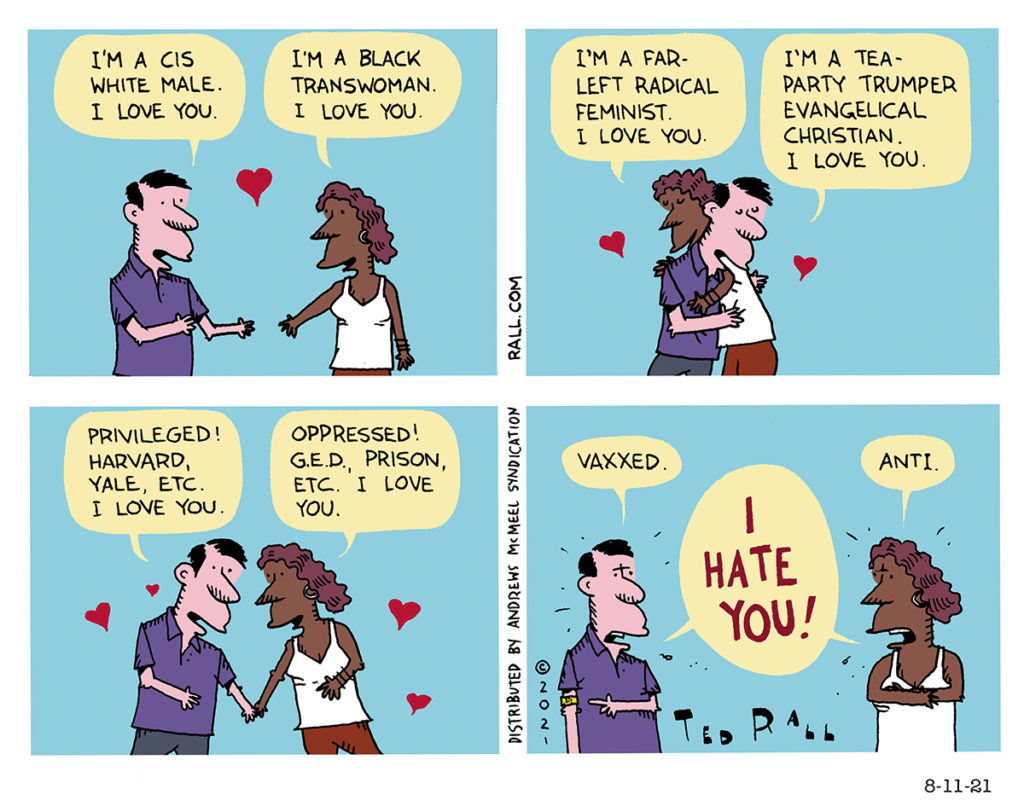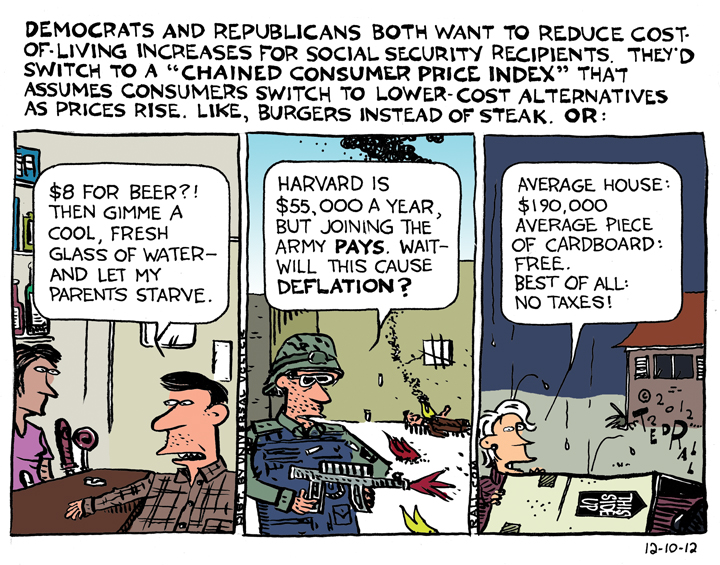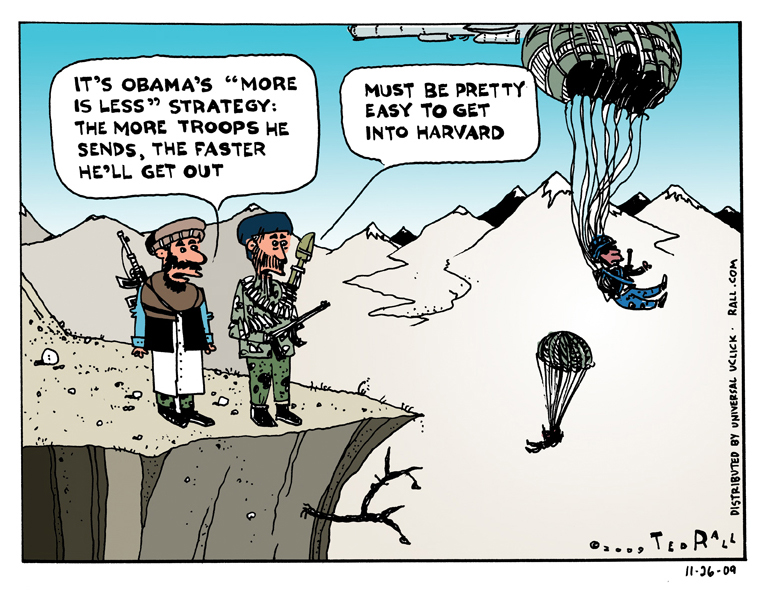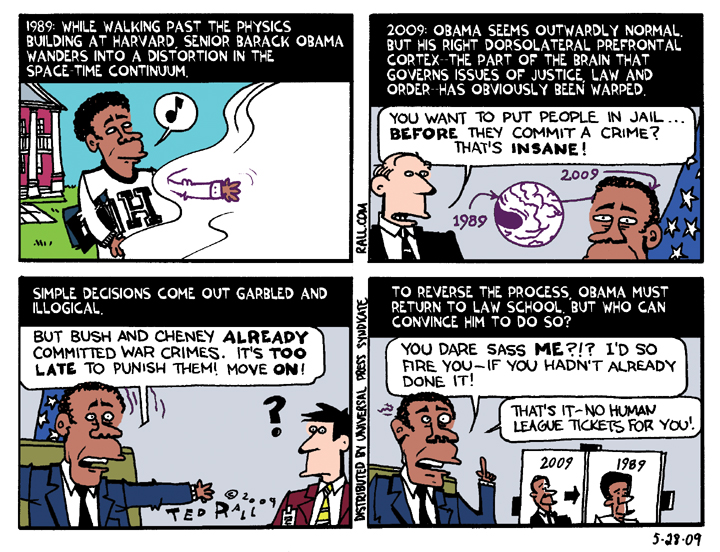Whether or not to get vaccinated against the coronavirus has become the most controversial and divisive political issue in the country today. It literally separates families from one another in a way that no other issue has in recent memory.
The Potato Salad Society
Some dude posted a Kickstarter asking for $10 to make a potato salad. “It might not be that good. It’s my first potato salad,” he wrote. Thousands of backers gave him tens of thousands of dollars. Meanwhile, worthier Kickstarter projects - and charities - go unfunded. Most of the potato salad supporters wouldn’t give anything to help refugees in South Sudan.
SYNDICATED COLUMN: Torture is an All-American Value

Dianne Feinstein, chairman of the Senate Intelligence Committee and long-time-until-recently NSA apologist, claims to be shocked by an internal CIA report that documents the agency’s grisly record of torture after 9/11. “The report exposes brutality that stands in stark contrast to our values as a nation,” Feinstein said April 3rd. “It chronicles a stain on our history that must never again be allowed to happen.”
Among the “stunning revelations” that have leaked out of the still-classified 6,600-page CIA torture report are stories that long-time followers of my writing have long been aware of, having read about them in my column during the Bush years. Guantánamo isn’t just a concentration camp; it’s also a CIA “black site”/torture dungeon, as was a joint US-UK “extraordinary rendition” depot on the Indian Ocean island of Diego Garcia. The CIA outsourced torture to Third World shitholes/U.S. allies, knowing/expecting/hoping that they would be murdered.
Disgusting stuff. For sure. Yet there’s something even more nauseating — and infinitely more dangerous — than a country that tortures:
A nation in denial about its true values.
Feinstein speaks for most Americans when she characterizes War on Terror-related torture as an aberration. But she’s mistaken. Conventional wisdom is wrong.
Torture is as American as red, white and blue.
Like the citizens of Nazi-occupied Europe during World War II who had a pretty good idea that those eastbound trains were a one-way ticket to hell, Americans have known since the beginning of the War on Terror that their government was going to torture, was torturing and had tortured. It is still torturing today. Yet hardly anyone complains.
Five days after 9/11, on September 16, 2001, Dick Cheney told Tim Russert on “Meet the Press”: “We also have to work, though, sort of the dark side, if you will. We’ve got to spend time in the shadows in the intelligence world. A lot of what needs to be done here will have to be done quietly, without any discussion, using sources and methods that are available to our intelligence agencies, if we’re going to be successful. That’s the world these folks operate in, and so it’s going to be vital for us to use any means at our disposal, basically, to achieve our objective.”
At the time, everyone knew what that meant.
The Vice President of the United States, speaking on behalf of the President, had announced to the world that the gloves were off, that the “quaint” Geneva Conventions were history. That the U.S. would torture.
Had Cheney’s endorsement of “brutality” been “in stark contrast to our values as a nation,” as Feinstein puts it, there would have been political blowback. Imagine if the president of, say, Sweden, had said the same thing. The dude would’ve been out of a job.
Au contraire — Cheney’s siren call to the “dark side” drew mainstream political approval, even from self-identified “liberals” in the corporate media.
In October and November of 2001, Newsweek‘s Jonathan Alter, FoxNews’ Shepard Smith (usually the network’s calm voice of reason), and CNN’s Tucker Carlson jumped on the torture bandwagon. All three reporter-pundits called torture a necessary, lesser evil in the fight against Islamist terrorists. Carlson (he’s the one with the bowtie): “Torture is bad. Keep in mind, some things are worse. And under certain circumstances, it may be the lesser of two evils. Because some evils are pretty evil.”
“Mr. Alter said he was surprised that his column did not provoke a significant flood of e-mail messages or letters,” reported The New York Times. “And perhaps even more surprising, he said, was that he had been approached by ‘people who might be described as being on the left whispering, I agree with you.'” (Or, more precisely, by people who were formerly on the left.)
If torture were repugnant to Americans, Cheney — and his pet pundits like Alter — would have met with a firestorm of criticism. They would have been fired. They were not.
By January 2002, the United States had defeated the Taliban and installed Hamid Karzai as the leader of a U.S. puppet regime in Afghanistan. Still, public tolerance/approval of torture continued. A famous legal scholar, Alan Dershowitz, published an op/ed calling for the creation of “torture warrants”: “The warrant would limit the torture to nonlethal means, such as sterile needles, being inserted beneath the nails to cause excruciating pain without endangering life.”
These are the words of a madman.
By objective standards, if the U.S. were a nation where torture stood “in stark contrast to our values,” Dershowitz would have been shouted down and ridiculed. It would be hard to imagine Harvard Law — Harvard Law! — keeping such a raging nut on its payroll. But they did.
Because torture is not at against our values. Not in the least.
Dick Cheney: not forced to resign.
Jonathan Alter, Shepard Smith, Tucker Carlson: all still legit, all still capable of landing big book deals and big speaking fees. They run in circles where real lefties like me — who bitched about CIA torture and kidnapping in countless cartoons and columns — are blackballed.
Which makes perfect sense. Because Americans love torture. A dozen and a half years after 9/11, 68% of Americans still tell pollsters — even though it’s been proven ineffectual — that torture is A-OK.
A polarized nation? When it comes to anally raping young men with flashlights and broomsticks — that happened at Gitmo and the U.S.-run Bagram torture center, and may be continuing — we’re still United, We Stand.
So when newly-minted President Barack Obama told Americans in 2009 that he planned to “look forward, not back“— i.e., not holding anyone accountable for Bush-era torture — and visited Langley to assure nervous torturers that they could chillax, no one cared.
When government-sanctioned torture continued under Obama, no one cared.
Even when Americans rose up in 2011 to protest their government, as part of the Occupy Wall Street movement, torture was less than an afterthought on the activists’ menu of complaints.
American “progressives” don’t care either. There has never been a mass demonstration against torture. (Well, not in the U.S. There have been big marches in Egypt and Bahrain.)
Torture against American values? Hardly. From American troops who mutilated the genitals of Native Americans to waterboarding Filipino independence fighters in the early 20th century to organized rape gangs in Vietnam, torture has been all-American.
(Support independent journalism and political commentary. Subscribe to Ted Rall at Beacon.)
COPYRIGHT 2014 TED RALL, DISTRIBUTED BY CREATORS.COM
SYNDICATED COLUMN: Why Don’t Kids Want to Study Engineering? Because Engineering Friggin’ Sucks.

Sexing Up Science Won’t Solve a Dearth of STEM Majors
According to a survey, nearly 90% of 16- and 17-year-olds have no interest in a STEM (science/technology/engineering/math) career.
The climate is crashing, the NSA is tracking our porn, and the 99% haven’t gotten a raise in decades, but the party organ of America’s ruling class is truly, awfully worried about our imminent STEMlessness. A lot.
“The number of students who want to pursue engineering or computer science jobs is actually falling, precipitously, at just the moment when the need for those workers is soaring,” writes The Editorial Board of The New York Times, which is composed of editors no one has heard of, yet whose opinions we are all supposed to care about. “Within five years, there will be 2.4 million STEM job openings,” write The Editors.
Who, in the future, will program the great fleets of killer drones? Who will pilot them? It would suck to lose that business to the Chinese.
Whenever the question of Why No One Wants to Study Engineering comes up, the media always comes back with the same answer: conning convincing kids that STEM stuff isn’t boring.
“Most schools continue to teach math and science in an off-putting way that appeals only to the most fervent students,” the Times editors complain. Sex up the sciences — that’s the ticket!
Texas Instruments (they’re still around?) has hired neuroscientist/”Big Bang Theory” actress Mayim Bialik as a “STEM education brand ambassador” to sing the praises of partial differential equations using framing that the Kids of Today/Worker Bees of Tomorrow can relate to. “Who doesn’t know something about zombies or superheroes?” asks Bialik. “These cultural archetypes can do more than just entertain. Zombies, it turns out, can teach real science and mathematical concepts like exponential growth curves and the intricacies of human anatomy and anatomical degradation. Superheroes can prompt a variety of questions that draw on physics, such as: How does one actually travel faster than the speed of light?”
Is it me, or does this seem a little…forced?
Hey, I’m as geeky as they come. When an engineer who designed famous roller coasters gave a talk at my Ohio high school, I was enthralled. (My classmates, not so much.) But I still didn’t want to study engineering — and it wasn’t because science is boring.
I loved math, chemistry and physics in high school. I studied years ahead. I got perfect grades and tested so well that Columbia’s School of Engineering offered me a full scholarship and a well-paid teachers assistant job.
Still, I didn’t want to go. Not because math and science bored me — to the contrary. I dreaded it because I knew engineering school would probably be a sucky experience and that a career in the sciences would be depressing.
Not that my parents cared what I wanted. They bullied me into going anyway because (a) Columbia gave me the most financial aid of the schools I applied to, and (b) something “practical” like engineering guarantees a steady well-paid job after graduation. (Ha.) So off I went.
Guess what? Engineering school was a sucky experience.
My experience at Columbia highlights reasons — aside from the alleged tedium of math and science — that most young people aren’t interested in the STEM professions:
- When you study math and science, your classmates are boring. At Columbia the engineering majors were politically disengaged, careerist, nose-to-the-grindstone types you’d never find working over the world’s problems at an overnight BS session — much less checking out a punk concert. They were academically smart and deadly dull. After graduation, people similar in personality to your fellow students become your colleagues. Engineering isn’t boring. Engineers are. Working with boring engineers is a bummer.
- STEM majors get much lower grades than liberal arts majors. Tougher grading causes lower GPAs, so dropout and expulsion rates are also much higher: three out of four liberal art majors get a degree, only one out of four STEM majors. During freshman orientation, Columbia’s dean of students told us that 75% of us would drop out or get expelled. I wondered why I was there. (After three years, I was expelled with a 2.4 GPA. Which I worked hard for.) Why take out massive student loans for a one-in-four chance at a degree? Though some studies deny the difference, 60% of freshman engineering students are gone, dropped out or transferred to the liberal arts, by the end of their freshman year. These kids aren’t stupid or lazy — they were smart and studious enough to get admitted in the first place.
- Low social status. Guys don’t make passes at girls who wear safety glasses; girls suddenly remember something they forgot in the ladies room when you tell them you’re an electrical engineer. Because (see above) engineers are boring. Also: in America’s anti-intellectual culture, it’s not cool or hip or prestigious to be a scientist.
- STEM employment is sporadic (they say “cyclical”). What’s the point of playing it safe when it’s not, well, safe? The STEM major you pick as a freshman may easily be obsolete by the time you hit the senior year job fair. Even if not, it’s extremely unlikely your chosen scientific field will provide steady employment for years to come. Currently, as the Powers That Be say they need STEMmers, unemployment is sky high among STEM professionals. As of 2009, nearly 9% of electrical engineers were jobless. Oh, and it turns out that STEM majors actually don’t earn more than their liberal arts counterparts.
“Indeed, science and engineering careers in the U.S. appear to be relatively unattractive” compared with other career paths, Michael Teitelbaum of the Alfred P. Sloan Foundation in New York, which funds basic scientific, economic and civic research, testified to Congress in 2007.
High-school students know what’s up. They hear from older siblings how hard it is to graduate from engineering school. They watch their friends’ parents lose their jobs from supposedly “safe” STEM outfits. They’re not going to change their minds until reality improves.
Some fixes:
- De-ghettoize STEM majors within colleges and universities. Require STEM majors to take lots of liberal arts classes — it’s not like a math major shouldn’t study Spanish literature — and require liberal arts majors to take more math and science. Mix up the student bodies. Think about someone like Steve Jobs, whose design sense came from his love of art and calligraphy. The divide between English and physics majors is artificial and outdated. Crosspollinate.
- Put an end to the grading disparity between STEM majors and liberal arts. It’s unfair and it’s stupid. At Harvard, the average grade is an “A-“, and why not? The average Harvard student is intelligent and hardworking — and so is the average Columbia engineering student. Harvard’s softer grading regime hasn’t cost the school any reputation points.
- If America wants STEM majors from America, it ought to stop importing them from overseas. “When the companies say they can’t hire anyone [for STEM jobs], they mean that they can’t hire anyone at the wage they want to pay,” Jennifer Hunt, a Rutgers University labor economist, said in 2012. So they outsource STEM jobs overseas and game the work visa program to import cheaper foreign scientists. “Tech companies that import temporary workers, mainly recent graduates from India, commonly discard more expensive, experienced employees in their late 30s or early 40s, often forcing them, as Ron Hira and other labor-force researchers note, to train their replacements as they exit,” reports the Columbia Journalism Review. Until STEM unemployment among Americans is 0%, Congress ought to get rid of the visa program.
- Even cultural perceptions can be changed. If President Obama and other members of the political class are serious about promoting STEM careers, they could start featuring our best mathematicians and chemists at events like the State of the Union Address rather than the usual parade of military veterans. The Soviet Union pimped its scientific minds big time; kids who admired these intellectual heroes followed in their footsteps.
Math and science aren’t boring. But asking people to dedicate their lives to careers that won’t pay off is dumb.
(Support independent journalism and political commentary. Subscribe to Ted Rall at Beacon.)
COPYRIGHT 2013 TED RALL
Chained CPI
Democrats and Republicans both want to reduce the deficit using an accounting gimmick called “Chained CPI.” Under the Chained Consumer Price Index, increases in prices of products are ignored. Instead, it is assumed that consumers downgrade their purchases to cheaper products when prices for those they currently buy increase to the point that they can no longer afford them. Then the government uses these phony calculations to justify smaller cost of living increases to recipients of Social Security and other beneficiaries of programs indexed to inflation.





